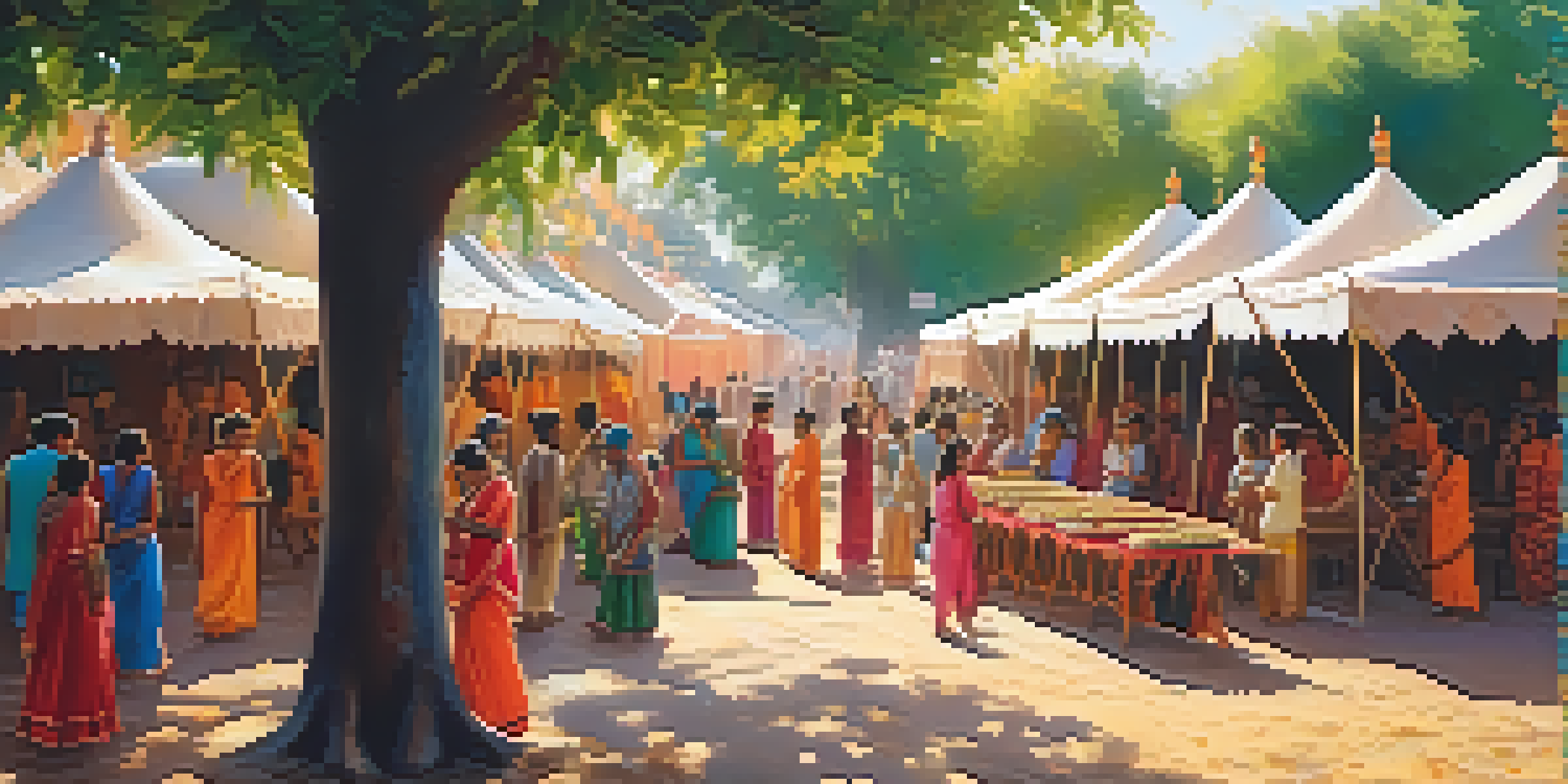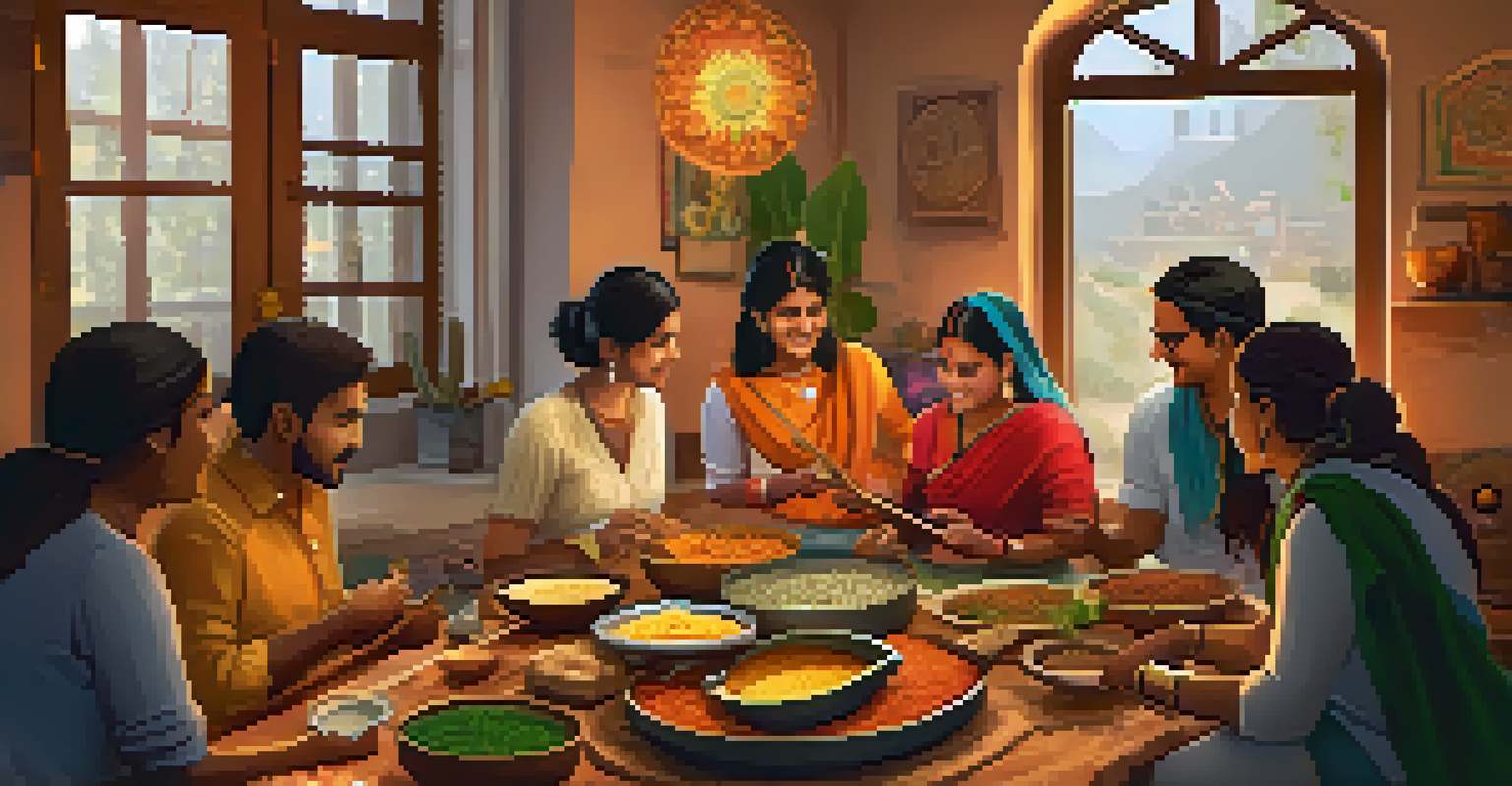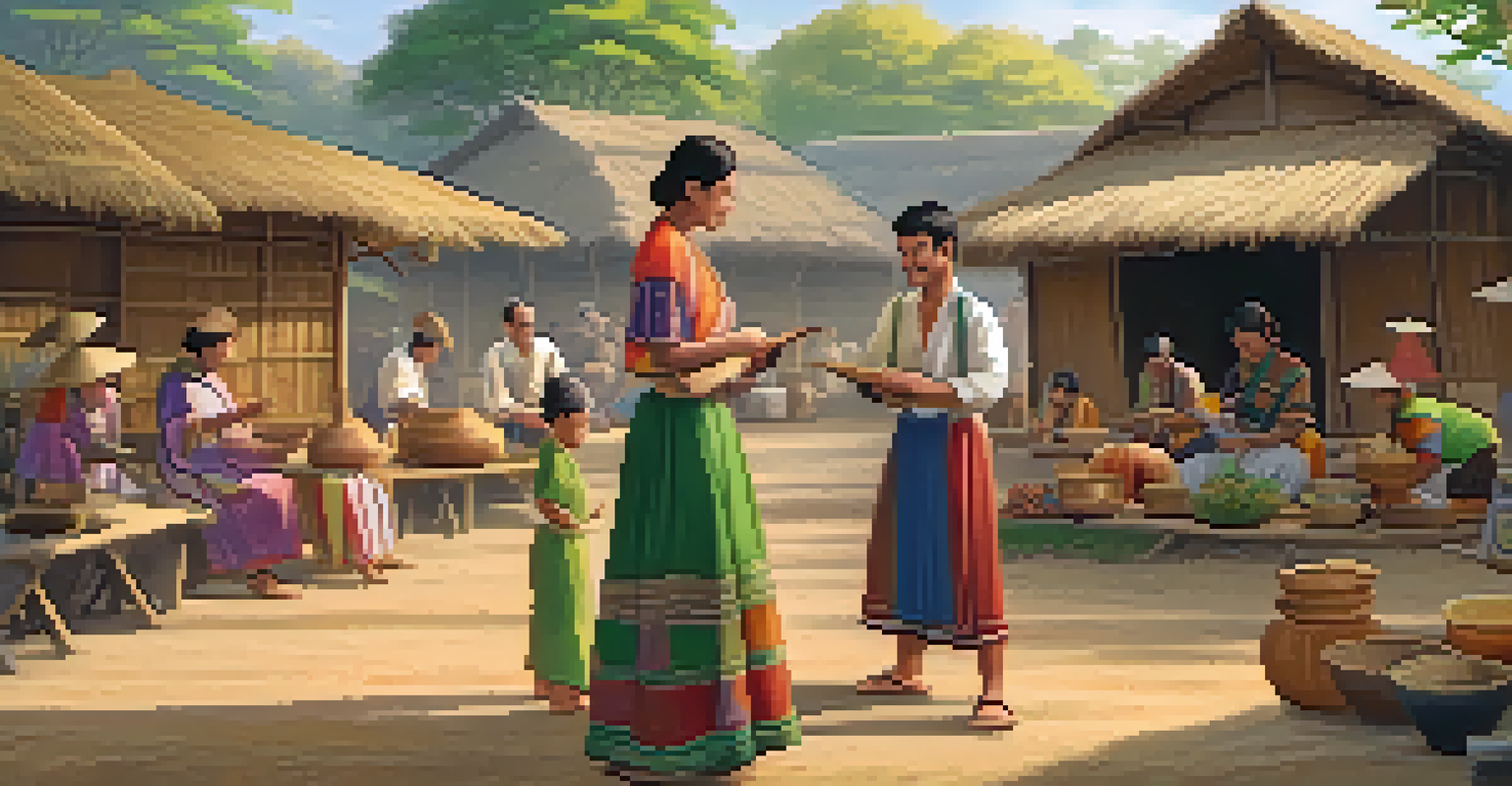Exploring Cultural Learning Exchanges in Indian Communities

Understanding Cultural Learning Exchanges in India
Cultural learning exchanges are initiatives that allow individuals from different backgrounds to share their traditions and knowledge. In India, these exchanges often take the form of workshops, festivals, or collaborative projects. They foster a rich tapestry of experiences that can deepen understanding among diverse communities.
Culture is the widening of the mind and of the spirit.
These exchanges not only focus on the exchange of cultural practices but also emphasize mutual respect and understanding. Participants can learn about various art forms, culinary traditions, and languages, enhancing their appreciation of each other's heritage. For instance, a cooking workshop where participants learn to make traditional dishes from different regions can be both fun and enlightening.
Moreover, cultural learning exchanges can play a crucial role in breaking down stereotypes and fostering inclusivity. By engaging directly with others, participants can challenge preconceived notions and build lasting friendships, making these exchanges powerful tools for social cohesion.
The Role of Technology in Cultural Exchanges
In our digital age, technology has transformed how cultural learning exchanges occur. Virtual platforms allow individuals from various parts of India and beyond to connect and collaborate without geographical barriers. This shift has made it easier for communities to share their stories and traditions with a broader audience.

For example, online workshops and webinars enable participants to learn from experts or cultural ambassadors from the comfort of their homes. This accessibility means that even those in remote areas can engage in cultural exchanges, ensuring that no voice goes unheard. It’s a testament to how technology can bridge gaps in understanding.
Cultural Exchanges Enhance Understanding
Cultural learning exchanges foster mutual respect and understanding by allowing individuals to share their traditions and knowledge.
However, while technology offers incredible opportunities, it also poses challenges. Maintaining the authenticity of cultural practices can be difficult in a digital format, and there’s the risk of cultural appropriation. Thus, it’s crucial for participants to approach these exchanges with sensitivity and respect for the traditions they are exploring.
Benefits of Cultural Learning for Local Communities
Cultural learning exchanges bring a multitude of benefits to local communities in India. They promote social cohesion by bringing together people from different backgrounds to learn and celebrate diversity. This interaction fosters a sense of belonging and community spirit, which is essential in today’s increasingly fragmented world.
The beauty of the world lies in the diversity of its people.
Additionally, these exchanges can stimulate local economies by attracting tourism and encouraging the sale of traditional crafts and foods. For example, a cultural festival featuring local artisans can draw visitors, allowing them to experience the culture firsthand while supporting local businesses. It’s a win-win situation that strengthens community ties.
They also provide opportunities for education and skill development. Participants can learn new skills that empower them and enhance their employability. Whether it’s mastering a traditional craft or gaining insights into sustainable practices, cultural learning exchanges can pave the way for personal and professional growth.
Examples of Successful Cultural Learning Exchanges
Several successful cultural learning exchanges have taken place across India, showcasing the potential of this practice. For instance, the 'Dastkar' initiative connects artisans with urban consumers, allowing them to share their crafts and stories. This not only preserves traditional crafts but also creates a platform for dialogue between different communities.
Another notable example is the 'Rural Craft Mela,' a festival that celebrates the arts and crafts of rural India. Here, artisans from various regions come together to showcase their work, conduct workshops, and engage with visitors. This exchange not only promotes cultural heritage but also provides artisans with economic opportunities.
Technology Expands Cultural Access
Digital platforms facilitate cultural exchanges, enabling participation from diverse geographical locations and ensuring broader engagement.
These examples illustrate how cultural learning exchanges can be both impactful and enriching. By sharing their skills and stories, participants help preserve traditions while forging new connections that transcend geographical and cultural boundaries.
Challenges Faced in Cultural Learning Exchanges
While cultural learning exchanges offer numerous benefits, they also face several challenges. One significant hurdle is the potential for miscommunication and misunderstanding between participants from different cultural backgrounds. Without proper facilitation, these exchanges can inadvertently reinforce stereotypes instead of breaking them down.
Additionally, logistical issues such as funding and resource allocation can hinder the organization of cultural exchanges. Many initiatives rely on grassroots efforts, which may not always have the necessary support to flourish. This lack of resources can limit the scope and reach of these valuable programs.
Finally, there’s the challenge of ensuring that exchanges are genuinely reciprocal. Often, one group may dominate the conversation, leaving others feeling marginalized. It's essential that all voices are heard and respected to ensure that cultural learning exchanges are equitable and beneficial for everyone involved.
The Future of Cultural Learning Exchanges in India
The future of cultural learning exchanges in India looks promising, especially with the increasing awareness of their value. As more individuals and organizations recognize the importance of cultural exchange, we can expect to see a rise in initiatives aimed at fostering understanding and collaboration. This growing interest can lead to more innovative and inclusive programs.
Moreover, as technology continues to evolve, virtual exchanges will likely become more sophisticated and widespread. This shift could open doors for even greater participation, allowing individuals from diverse backgrounds to connect and share their cultures. Imagine a world where anyone can join a workshop on traditional Indian dance, regardless of where they live!
Local Communities Benefit Economically
Cultural exchanges stimulate local economies by attracting tourism and providing opportunities for education and skill development.
Ultimately, the success of these exchanges will depend on our commitment to inclusivity and respect for cultural diversity. By nurturing these values, we can create a vibrant cultural ecosystem that celebrates and honors the rich heritage of all communities across India.
How to Get Involved in Cultural Learning Exchanges
Getting involved in cultural learning exchanges is easier than you might think! Start by exploring local community centers, cultural organizations, or online platforms that host events and workshops. Many of these initiatives welcome participants from all backgrounds, making it a fantastic opportunity to learn and connect.
You can also consider volunteering or collaborating with organizations that focus on cultural exchange. Whether it’s helping to organize events or facilitating workshops, your involvement can make a difference. Plus, you’ll gain firsthand experience and insights that can enrich your understanding of different cultures.

Lastly, don’t hesitate to share your own culture and traditions! By participating in exchanges as both a learner and a teacher, you contribute to a dynamic dialogue that benefits everyone involved. Remember, cultural learning is a two-way street, and your unique experiences can enrich someone else's journey.